The end of the world
One day, it's all gone. Even the sky.
I love (almost) everything about this episode. From the Doctor boasting to Rose at the very beginning, to the tune of “Clockwork T.A.R.D.I.S.”, a piece I like enough to have it as my phone ringtone, to Rose being genuinely touched by watching the Earth disintegrating, to the gifts of air from Doctor’s lungs, to Doctor telling Rose about his dead planet. I don’t even mind that weird scene when the Doctor slows the time down, a strange ability which he doesn’t seem to use ever again.
Also, this is the first episode in Series 1 where we learn that RTD dislikes two things: religion (“Guests are reminded that Platform One forbids the use of weapons, teleportation and religion”) and the rich (“Mind you, when I say "the great and the good" what I mean is the rich.”). Personally, I kind of like putting weapons and religion together – it reminds me of the concept of Ecclesia militans, or the Church militant, and the struggle Apostle Paul describes in Eph 6:11. The idea of a spiritual battle against sin and the devil, while maybe a bit less popular nowadays than it was, describes the life of everyone who tries to do good very well. (Let me also mention here that one of my favorite literary descriptions of the clash with the forces of evil is the first chapter of C.S. Lewis’ Perelandra.) I also like to think that the reason religion was forbidden on Platform One was that religion is actually powerful, so it is actually a praise of religion. (I admit that this is more than a bit demagogic – there exist, for example, definitely false ideas which are “powerful” in the sense of being convincing and dangerous lies.) And just to split hairs a bit, the verb “use” may suggest taking an advantage from something, so “using religion” should in fact be frowned upon by that very religion. But of course both these thoughts are sligthly silly rationalizations for a slightly silly line by a seriously religious person who tries really hard not to be offended by it. And that line’s primary purpose plot-wise is of course to introduce the ban on teleportation Lady Cassandra will later break.
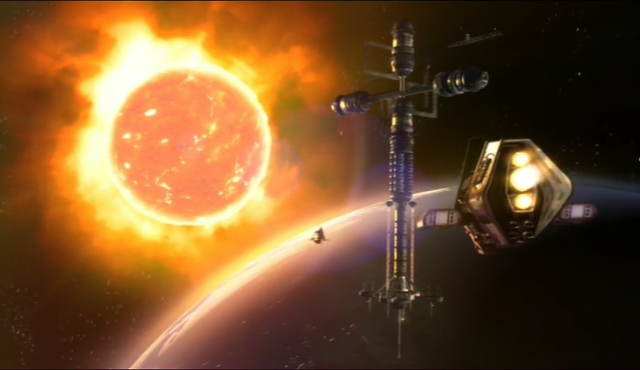
A huge structure where a sacrifice was made so that others can live.
It is also difficult to miss that the Doctor doesn’t seem to like “the rich” very much. Good thing that Jabe – from her behavior, definitely rich and posh – saved the day near the end… In reality, being rich is no more immoral than being, say, tall. (Of course you have much more influence on your wealth than height, so the analogy is somewhat flawed.) You can get all prideful about it or use it to do more good, like helping shorter people to reach a high shelf so that they don’t need to wear heels;-). Incidentally, I personally know at least two really rich people not spoiled by their fortune and not a single one of the other kind.
Anyway, there is a lot more I’d like to say about this episode. It is quite obvious that the Doctor wants to have someone share his experience of having his home planet burned down, to have someone who can relate to him. And good thing he chose Rose, who is definitely a very compassionate person. But let’s now deal with the main topic of “The end of the world”.
Everything has its time
It is quite obvious that this is the overarching theme of this episode. First the Steward, then Jabe, then Lady Cassandra, and then Earth expire within a few minutes. These four deaths (technically three, since Earth is not a living organism like a human or an animal, so its “death” is a bit metaphorical) are very, very different.
The Steward is so preoccupied with his job that he doesn’t even notice that his end is very near. When something wrong starts to happen, he first lies to the guests (“gravity pockets may cause slight turbulence” – yeah, sure…), then rambles about the possibility of the guest suing the owners. It is a sad fact that so many people are so distracted by minor things and busy worrying about insignificant affairs that they don’t even notice their life passing…
Jabe gives her life voluntarily. Well, if she didn’t sacrifice herself, she would probably have died anyway, but still – she is the first one in the very, very long line of people in (New) Doctor Who who surrendered their lives for others with calmness and dignity. And I am really sad that there seems to be a serious plot hole here: after all, if the Doctor can (subjectively) “slow down time” like he did seconds after Jabe burned to death, her sacrifice looks completely unnecessary… Well, maybe the only reason he could do what he did was that he was extremely moved by her demise. Of course, the very fact that I am trying to find some way to make Jabe’s immolation meaningful is a testament to the fact that we, people, really want our lives – and deaths – to mean something. And even if it looks otherwise, they do mean a lot to our Creator (cf. Ps 116:15).
Lady Cassandra dies way later than she would in the normal course of events – she might be a metaphor for someone on life support, who cannot live without getting, well, artificially moisturized all the time. And this raises a very delicate question: did the Doctor kill her? Was what he did euthanasia? Was it moral? These are not easy questions. First of all, I would definitely say that this was not euthanasia, for the simple reason it was not Cassandra’s will to end her life. (Ok, that one was easy.) But did the Doctor kill her, and if so, is he guilty of murder? (By the way, these questions are separate – it is possible to kill someone but not be guilty, for instance in an accident when someone runs right in front of a speeding car.) I don’t have a 100% certain answer. What follows is what I think, but I do admit that I may be wrong.
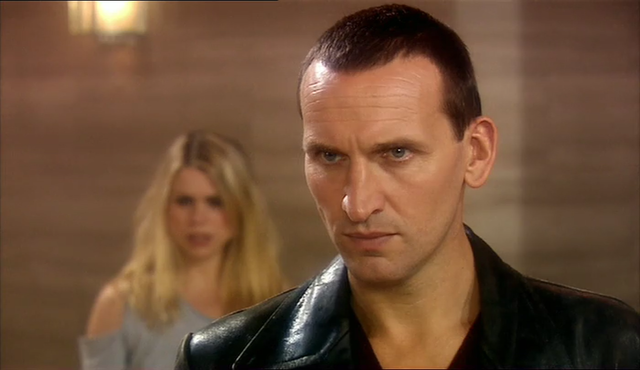
But if you could choose, Doctor, if you could decide who lives and who dies, that would make you a monster. – spoiler for series 4Bayldon Copper
First of all, I am fairly sure it is possible to be guilty of someone’s death through inaction. Not helping an accident victim when someone is able to help them is an obvious example. I would say that while technically the Doctor did not kill Cassandra, if he was able to prevent her death, he was responsible for it. The next question, then, is: could he prevent her from dying? The answer is, most probably, yes. After all, he is a master of MacGyvering, and even without the equipment used by Cassandra’s crew, he could surely think something up to moisturize her. On the other hand, there was very little time for that. Less than 30 seconds passed from the second Cassandra was teleported back to Platform One to the moment the Doctor said that she was creaking. Even assuming that he was aware of the problem from the very beginning (which may or may not be the case), that’s not a lot of time to do something. This means that, if I were a judge, I would probably say that the Doctor can’t be proven guilty, even though I am personally convinced that he was both aware of the problem early enough and able to save her if he chose to. Well, it’s definitely neither the first nor the last time we see a darker side of the Doctor… (And one could also argue that the punishment for Cassandra felt very fairy-tale’y, so to speak. Death as a punishment is dealt freely in that genre, and this may well be yet another instance of Doctor Who being closer to a fairy tale than to a sci-fi show instead of a manifestation of the darker side of the titular Time Lord.)
What is much more interesting is another question, only vaguely suggested by Cassandra’s fate. Is it moral to cut off a person’s life support when they cannot live on their own and there is no hope of healing them? This can lead to an interesting (and long) discussion on its own, so let me only mention Paragraph 2278 of the Catechism of the Catholic Church which deals with this difficult subject.
Finally, we have “Earth death”, the main cause of the whole event. Interestingly, this is much closer to the idea of “over-zealous treatment” mentioned in the previous paragraph: they were keeping Earth in an “alive” state artificially for a long time until the funds ran out, and there was no mention of a possibility of a total avoidance of its destruction – only that it could be postponed. And here comes the most powerful message of the whole episode.
You think it'll last forever, people and cars and concrete. But it won't. One day, it's all gone. Even the sky.
This is – again! – a reminder that our time on this Earth (and in fact, Earth’s – and our whole universe’s – own time) is limited. It is also in stark contrast to the earlier remark: “You lot… you spend all your time thinking about dying. […] But you never take time to imagine the impossible, that maybe you survive.” How to reconcile these two, apparently contradicting, quotes? (Technically, on a very superficial level, they are of course not contradictory at all – every human is mortal, Earth will be destroyed one day, but humanity may well survive that. But of course this is not what I mean.) I have two personal takeaways here.
One is this: maybe I won’t die? Maybe I am one of those lucky few who will live to the actual end of the world and witness Jesus Christ coming back in His glory? While I do not count on it, it’s a possibility. (Not that I think it would be much easier – or easier at all – than just dying like so many people do. The Book of Revelation assures me that the literal end of the world will be no picnic!)
But there is another one, maybe even more important. What I should be doing is to be aware of my mortality, and strive to be ready for my death at any time – but at the same time not to be afraid of it, just live normally – love God with all my heart, soul and mind, and love my neighbor as myself, work and play, laugh and cry like every human being. And of course, not only imagine, but believe “the impossible” – that I will survive, forever, in Heaven.
And who is my neighbor?
Speaking of “my neighbor” – it is difficult not to think about the famous question of the scholar of the Law from Luke 10:29, “And who is my neighbor?”, when Rose and the Doctor discuss what the word “people” means. Unsurprisingly, the Doctor is much more generous with the term than his companion. While initially Rose seems unconvinced, her later actions – especially towards the poor Raffalo and later Cassandra – show that she learned her lessons. And this is something really great. It means that other people have intrinsic dignity and deserve our respect (not to mention love!) irrespective of their origin, race or nationality (I think we can agree that the alien Raffalo may stand for people of different culture, skin color or country of origin) and irrespective of their deeds (Cassandra is a human, but is guilty of many things – and yet Rose pities her and wants the Doctor to save her!).
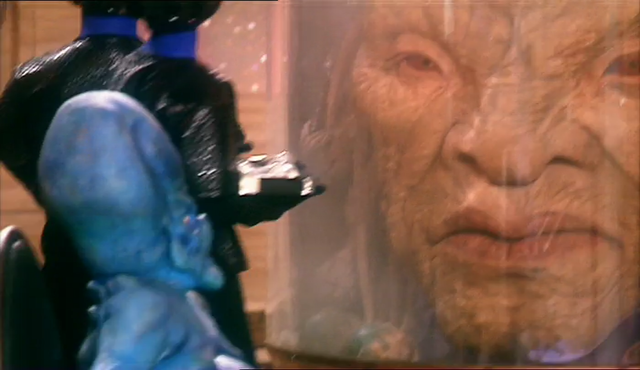
The aliens are so alien, and yet they are people. Interestingly, the Moxx of Balhoon is played by Jimmy Vee, a dwarf actor and stuntman. Dwarfs were yet another group treated as not entirely human in the past.
On the other hand, Cassandra tends to view the term “human” as applicable only to people like her – either “pure humans”, or beings she considers smart enough for her (she infamously tells the Doctor, “so, you passed my little test. Bravo. This makes you eligible to join the Human Club.”). The temptation to treat some of our fellow humans as somehow “less human” is – and has been – always there. It seems a sad pattern that every epoch has its own category of people denied the right to be called as such, which often leads to predictable outcome of denying them other rights, the right to live being one of the most fundamental ones. Slaves (several centuries ago), Jews (about one century ago), the unborn (nowadays)… It makes one wonder who is going to be next…
Anyway, here we have another, very strong and very Christian message from this episode. No wonder I like it so much!
Other tidbits
Of course, there is much, much more about this episode than I highlighted above. Despite it being very serious, we have a good laugh when the Doctor donates “air from his lungs” to other passengers of Platform One. Cassandra calling a jukebox an “iPod” made me almost fall from my chair. The “classical music” and “traditional ballad” were also pretty amusing (though these become much less funny if you pay attention to the lyrics).
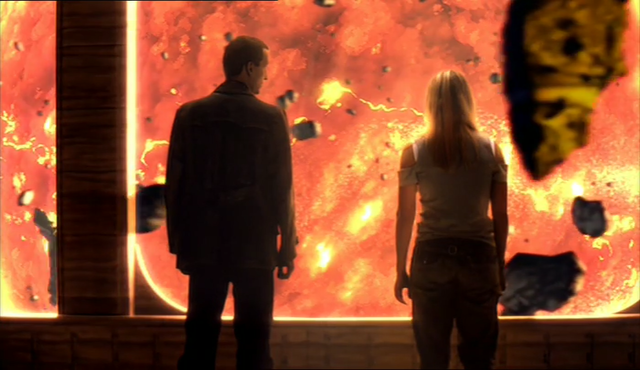
“It's gone. We were too busy saving ourselves. No-one saw it go.” Good thing that spoiler for series 7Eleven and Clara were down there taking pictures!
There are also touching moments here. When Rose is overwhelmed by all the aliens she sees and runs out, the Doctor rushes after her, showing his caring side. Rose’s call to her mother is another emotional scene I liked. In a blink-and-you’ll-miss-them three seconds we can see the empty chair of Moxx of Balhoon and his friends grieving. Probably the most moving one, however, is when the Doctor comes to the main room and breaks the news of Jabe’s death to her fellow trees. And in a second it becomes chilling when Rose gently asks the Doctor “You all right?”, to which he responds “Yeah, I'm fine.” You just know that you really, really don’t want the Doctor to be angry at you… Finally, the scene when Rose comments how no-one was watching the Earth’s destruction, and then – after a few moments – she sees contemporary London with completely new eyes. Speaking of that…
Last but not least
The thing that I saved for the end is not the most important one, but I find it worth mentioning anyway. When the Doctor asks Rose if she wants to go back home or continue traveling with him – now that she knows even better how dangerous it is – Rose tells him that she wants… chips. While I generally praised Rose for her compassion throughout the episode, I have to say that avoiding a life-and-death question like this is undoubtedly not the wisest move. When making important decisions, we should definitely consult our reason first and not our sense of smell… Of course, I do not mean that we should always make decisions in a calculated, cold way – there are cases when an apparently “unreasonable” course of action is a good one, maybe even the best one – but a “let’s think about it later” attitude is not something I would recommend. This, however, is a topic I’d like to revisit later (since it’s not the only time this issue comes up in Doctor Who), as this post is already pretty long.
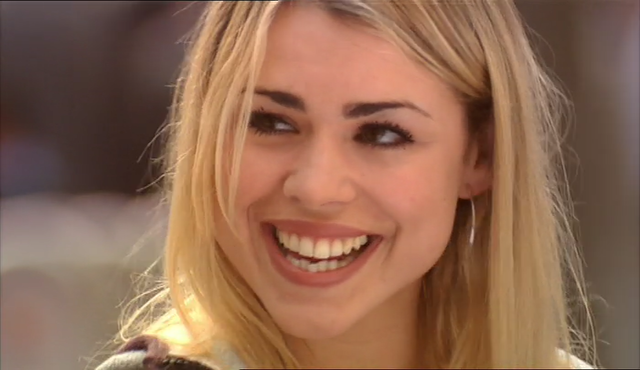
“We’ve only got five billion years till the shops close.” I love the human ability to crack jokes even in the most dramatic situations.
Until next time!